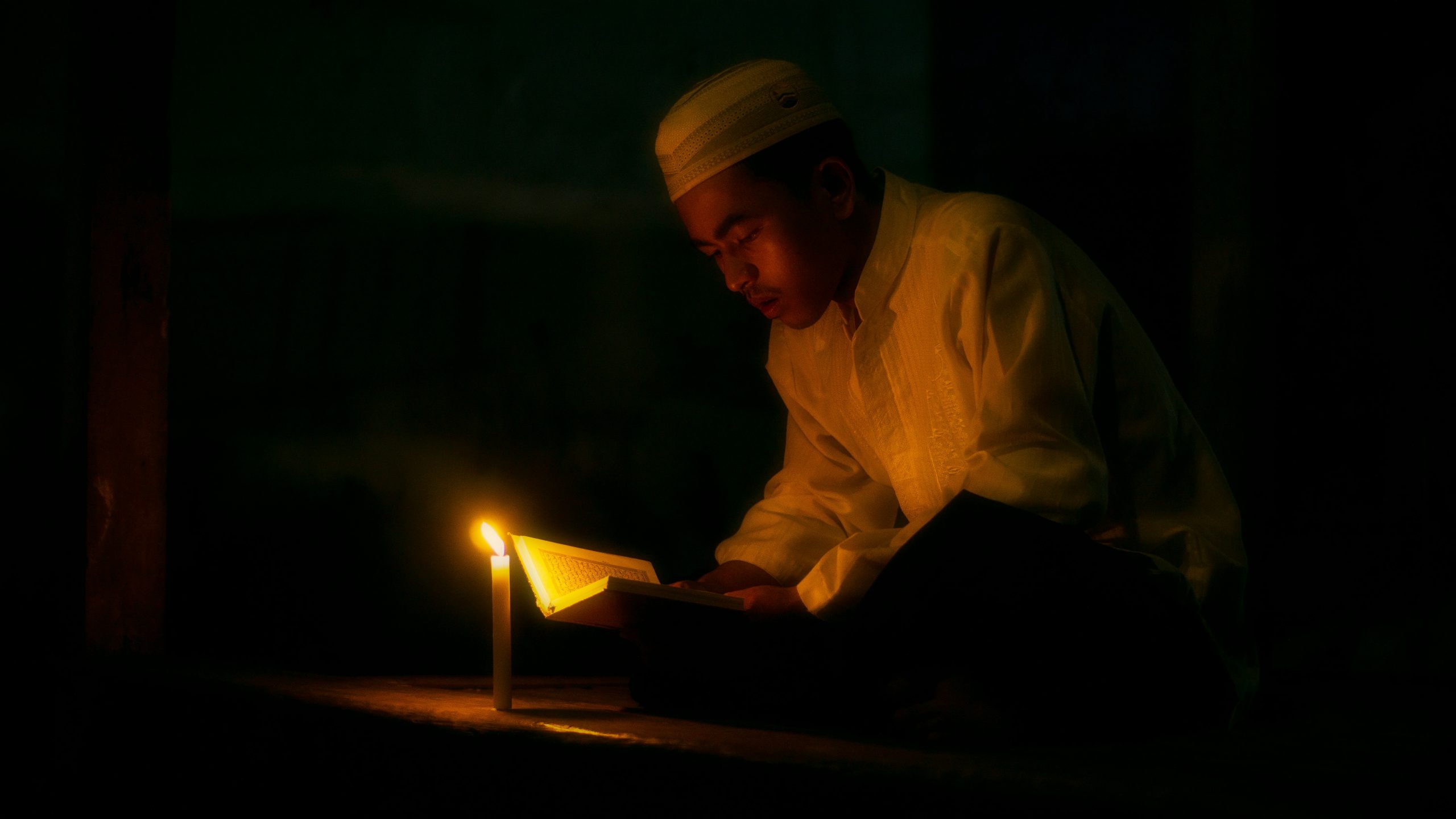#Islam
The Sacred Elixir: The Night Prayer And The Ordinary Muslim
Published

‘Amr ibn ‘Abasah 
“The closest the servant is to the Lord is during the last depth of the night. If you can be among those who remember Allah in this moment, then do so.” [Sunan al-Tirmidhī]
Allah 







Tahajjud, the night prayer, is that sacred elixir.
Guidance from Surah Muzammil
Keep supporting MuslimMatters for the sake of Allah
Alhamdulillah, we're at over 850 supporters. Help us get to 900 supporters this month. All it takes is a small gift from a reader like you to keep us going, for just $2 / month.
The Prophet (SAW) has taught us the best of deeds are those that done consistently, even if they are small. Click here to support MuslimMatters with a monthly donation of $2 per month. Set it and collect blessings from Allah (swt) for the khayr you're supporting without thinking about it.
بِسۡمِ اللهِ الرَّحۡمٰنِ الرَّحِيۡمِ
“O you the (sleeping) enwrapped one!” [Surah Al-Muzzammil: 73;1]
“Stand up in Prayer by night, all but a small part of it;” [Surah Al-Muzzammil: 73;2]
“half of it, or reduce it a little;” [Surah Al-Muzzammil: 73;3]
“or add to it a little; and recite the Qur’an slowly and distinctly.” [Surah Al-Muzzammil: 73;4]
In the 73rd chapter of the Qur’an, Allah 
“Behold, We shall cast upon you a Weighty Word.” [Surah Al-Muzzammil: 73;5]
It is as though Allah 
Receiving and enacting the injunctions of the Holy Qur’an, embodying its message, extending its invitation to the entire creation, and catalyzing a revolution in the entire framework of belief, thought, morals, manners, civilization, and social life is undeniably the weightiest task any human being has ever been assigned.
It has also been called a weighty word because bearing the burden of its actual revelation was a difficult and heavy duty. Zaid bin Thabit 
Lady Aishah 
In another tradition, Lady Aishah 
“Surely getting up at night is the best means of subduing the self and is more suitable for uprightness in speech.” [Surah Al-Muzzammil: 73;6]
The Mufassirs (exegists) of the Qur’an explain the meaning of the above verse and give four possible meanings explaining why the night is the best means of subduing the self and more suitable for upright speech.
- Engaging in night worship and prolonged prayer is against human nature and the nafs (ego) of man seeks ease and comfort during those late hours. However, this practice serves as a potent exercise in self-control and discipline. Those who adopt this method and achieve mastery over their body and mind are empowered to channel their abilities toward the path of God. Such individuals can operate more efficiently, working steadfastly to make the message of true faith prevail in the world.
- This serves as a highly effective method to establish harmony and concord between the heart and the tongue. During these pre-dawn hours, there is no interruption nor interference between the servant and Allah
the Sublime., Whatever a person articulates with their tongue in this state reflects the authentic voice of their heart.
- This proves to be a highly effective approach to aligning the outer and inner aspects of an individual. Someone who, in the solitude of the night, willingly forsakes comfort and ease to engage in worship where no person sees him or knows of his acts, does so with genuine sincerity. It is done purely for the pleasure of Allah
the Exalted with no room for pretense or hypocrisy.
- As this worship is more difficult than daytime worship, it develops steadfastness in individuals. It empowers them to tread the path of God with increased resilience, enabling them to confront and endure the challenges of that journey with heightened constancy and determination.
Finally, during that period, individuals can read the Quran with a heightened sense of tranquility, focus, and comprehension. Ibn Abbas elucidates that this time is particularly conducive for deep reflection on the Quran. [Abu Daud]
Al-Nawawi reported: Al-Hasan ibn Ali 
The Significance of the Last Third of the Night
Let us keep in mind the profound significance of the latter part of the night, specifically when one-third of it is left, when the Almighty descends to the lowest heaven, in the manner He knows best, and says,
“Who supplicates Me so that I may answer him? Who asks Me so that I may give to him? Who asks Me forgiveness so that I may forgive him?” [Sahih Muslim]
And this is available to us every night of the year, and facilitated for us in the blessed month.
Allah 
“Believers! Fasting is enjoined upon you, as it was enjoined upon those before you, that you become God-fearing.” [Surah Al-Baqarah: 2;183]
Abu Umamah reported: The Messenger of Allah ﷺ said,
“You must perform the night prayer for it is the habit of the righteous who came before you, it brings you closer to your Lord, it expiates your evil deeds, and prevents you from sinning.” [Sunan al-Tirmidhī 3549]
Ramadan, a time when the nafs (ego) is subdued by being deprived of its physical nourishment of food and drink during the daylight hours, conversely, the ruh (soul) is elevated and nourished by the Word of God. This is a key catalyst for personal reformation and attaining the goal of taqwa.
A Divinely Facilitated Schedule

PC: Yayan Mulyana (unsplash)
He 



The Messenger of Allah ﷺ said, “Hold fast to night prayer, for it was the way of the righteous before you, a way of drawing closer to your Lord, an expiation for wrong deeds, and a shield from sin.” [Tirmidhi, and others] In some narrations, there is an addition, “And it repels sickness from the body.” Further, the Messenger of Allah ﷺ was asked, “What prayer is most virtuous, after the obligatory prayers?” He said, “Prayer in the depths of the night.”
Surprisingly Imam Baghawi 


Maybe the key to understanding the obligatory nature of tahajjud lies in the reformative and spiritual training experienced by the first generation of Muslims. Similar to constructing a building, the foundation must be robust and sturdy for the structure to endure and stand the test of time. Nothing is as crucial to the establishment of this endeavor as it is to fortify the foundation of the Deen of Islam, meant to endure until the Last Day. Tahajjud might have played a pivotal role in fostering this spiritual fortitude, drawing hearts closer to their Lord, and enabling them to withstand the rigorous and harsh tests on their faith posed by the disbelievers of Makkah.
Preparation for Spiritual Ascendency
Training our nafs through challenging tasks such as tahajjud is training our inner selves to obey and adhere and uphold the Divine laws.
Further, in the tafsir of the Surah al Muzammil, Allah 
May we delve into a profound understanding and contemplation of the purpose behind tahajjud, appreciating the divine schedule outlined for us in the sacred month of Ramadan. Let tahajjud serve as the catalyst propelling us towards divine closeness, becoming a steadfast practice not only during Ramadan but also a strengthening force to alleviate all our challenges and concerns throughout our lives. May it be a means of peace for us in this worldly life, and a means of entering the Abode of Peace in the Next*. Ameen.
*‘Abdullāh ibn Salām 

You may also benefit from Ustadha Shamira’s short reflection here:
Related:
– Best Ramadan Ever: Praying Qiyam
– A Prayer That Is Not Rejected: Al-Qarib Al-Mujib
Keep supporting MuslimMatters for the sake of Allah
Alhamdulillah, we're at over 850 supporters. Help us get to 900 supporters this month. All it takes is a small gift from a reader like you to keep us going, for just $2 / month.
The Prophet (SAW) has taught us the best of deeds are those that done consistently, even if they are small. Click here to support MuslimMatters with a monthly donation of $2 per month. Set it and collect blessings from Allah (swt) for the khayr you're supporting without thinking about it.
Born and raised in California’s Central Valley, Ustadha Shamira is passionate about educating and empowering Muslim women to reach their highest spiritual potential through acquiring sacred knowledge. Having graduated as valedictorian from a large public high school, her studies led her — following a brief soul-searching stint at Georgetown University — to seek sacred knowledge from scholars on three continents — Africa, Europe, and Asia. Ustadha Shamira began her journey in seeking sacred knowledge at the women’s Dar-ul-Uloom Mu’eenal Islam seminary in South Africa, and completed the five-year intensive ‘alima program at Ja’mia Al-Imam Muhammad Zakariyya, one of Britain’s first and most renowned Islamic universities for women. Thereafter, she continued her Arabic and Qur’anic studies in Damascus, Syria where she obtained an ijāzah in Tajwīd of the Ḥafṣ recitation from the late eminent Syrian scholar, Shaykh Ḥasan al-Kurdī. In 2005, Ustadha Shamira taught Hanafi fiqh for women at the Zaytuna Institute in California and since then has taught various Islamic sciences in venues across North America. In 2008, she earned a Master’s Degree in Demographics and Social Analysis from the University of California at Irvine, focusing on the identity formation of the Muslim-American population. In 2013, Ustadha Shamira specialized in the detailed rulings of menstruation, lochia, and abnormal discharge under the direction of Mufti Abdur Rahman Ibn Yusuf Mangera and assisted in compiling Imam Abu Hanifa’s Al-Fiqh al-Akbar Explained. As a wife and mother of five children, Ustadha Shamira has a passion to empower women in their child bearing years to gain closeness to their Lord. As a certified birth doula and lactation educator, she infuses her classes with Islamic spirituality and offers birth consultations and virtual doula services to Muslim women. Ustadha Shamira is a co-founder of the Rahmah Foundation and currently teaches for Nur al Iman, a full-time girls’ shariah program with Ustadha Mona Elzankaly based in the Bay Area.

You may like

[Podcast] Should Muslims Ally with Conservatives or Progressives? | Imam Dawud Walid

Iron Principle Under Pressure: A Profile Of Naledi Pandor

Far Away [Part 5] – There Is Only Work

Keeping The Faith After Loss: How To Save A Grieving Heart

Op-Ed: From Pakistan To Gaza – Why Senator Mushtaq Ahmad Khan Terrifies Power And Zionism

Restoring Balance In An Individualized Society: The Islamic Perspective on Parent-Child Relationships

Faith and Algorithms: From an Ethical Framework for Islamic AI to Practical Application

The Limits Of Obedience In Marriage: A Hanafi Legal Perspective

Quebec Introduces Bill To Ban Prayer Rooms On College Campuses

An Iqbalian Critique Of Muslim Politics Of Power: What Allamah Muhammad Iqbal’s Writings Teach Us About Political Change

[Dhul Hijjah Series] Calling Upon the Divine: The Art of Du’a (Part 1)

IOK Ramadan 2025: Four Steps | Sh Zaid Khan

IOK Ramadan 2025: Do Your Best | Sh Zaid Khan

IOK Ramadan 2025: Giving Preference to Others | Sh Zaid Khan

IOK Ramadan 2025: Which Group Are We In? | Sh Zaid Khan
Trending
-
#Islam4 weeks ago
Restoring Balance In An Individualized Society: The Islamic Perspective on Parent-Child Relationships
-
#Current Affairs1 month ago
Ahmed Al-Ahmed And The Meaning Of Courage
-
#Life1 month ago
AI And The Dajjal Consciousness: Why We Need To Value Authentic Islamic Knowledge In An Age Of Convincing Deception
-
#Life3 weeks ago
Faith and Algorithms: From an Ethical Framework for Islamic AI to Practical Application












